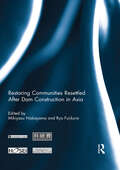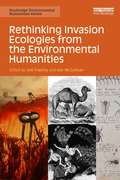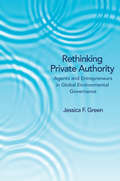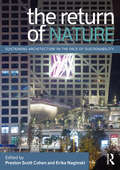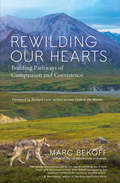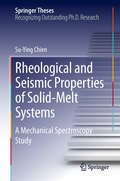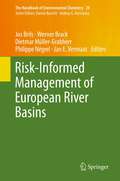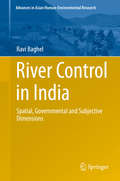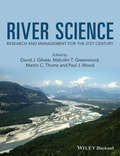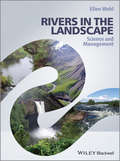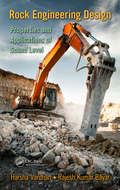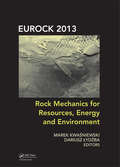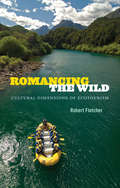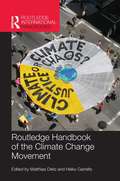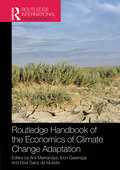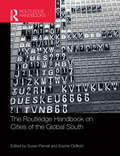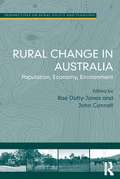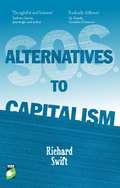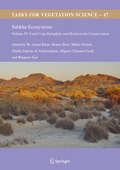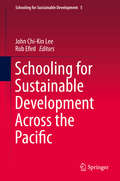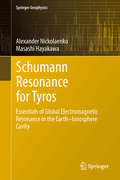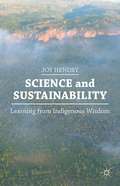- Table View
- List View
Restoring Communities Resettled After Dam Construction in Asia (Routledge Special Issues on Water Policy and Governance)
by Mikiyasu Nakayama and Ryo FujikuraThe rapid economic expansion and population growth of developing countries in Asia has led to increasing demands for water and energy. To meet these demands, large dam development projects have been completed, which has inevitably caused involuntary resettlement. In order to support these projects, dam developers must find appropriate ways to ensure adequate livelihood reconstruction for resettled individuals. Resettlement causes both short-term and long-term effects (both positive and negative) for the relocated populations, meaning that in order to evaluate the larger impact of such projects long-term post-project evaluations must be carried out. However, post-project evaluations by international donors have typically been conducted within a few years after completion; the long-term impact of such projects is seldom evaluated.This book aims to fill this gap. A study team composed of researchers from Indonesia, Japan, Lao PDR, Sri Lanka, and Turkey has conducted ten case studies focusing on resettled individuals satisfaction, opportunities offered, and income generation. The volume provides an overview of the ten case studies, which were carried out across five countries. It also discusses how a compensation programme should be designed and what sort of options should be presented to resettled individuals for their maximum benefit.This book was originally published as a special issue of the International Journal of Water Resources Development.
Rethinking Invasion Ecologies from the Environmental Humanities: Rethinking Invasion Ecologies From The Environmental Humanities (Routledge Environmental Humanities)
by Iain McCalman Jodi FrawleyResearch from a humanist perspective has much to offer in interrogating the social and cultural ramifications of invasion ecologies. The impossibility of securing national boundaries against accidental transfer and the unpredictable climatic changes of our time have introduced new dimensions and hazards to this old issue. Written by a team of international scholars, this book allows us to rethink the impact on national, regional or local ecologies of the deliberate or accidental introduction of foreign species, plant and animal. Modern environmental approaches that treat nature with naïve realism or mobilize it as a moral absolute, unaware or unwilling to accept that it is informed by specific cultural and temporal values, are doomed to fail. Instead, this book shows that we need to understand the complex interactions of ecologies and societies in the past, present and future over the Anthropocene, in order to address problems of the global environmental crisis. It demonstrates how humanistic methods and disciplines can be used to bring fresh clarity and perspective on this long vexed aspect of environmental thought and practice. <P><P>Students and researchers in environmental studies, invasion ecology, conservation biology, environmental ethics, environmental history and environmental policy will welcome this major contribution to environmental humanities.
Rethinking Private Authority: Agents and Entrepreneurs in Global Environmental Governance
by Jessica F. GreenRethinking Private Authority examines the role of non-state actors in global environmental politics, arguing that a fuller understanding of their role requires a new way of conceptualizing private authority. Jessica Green identifies two distinct forms of private authority--one in which states delegate authority to private actors, and another in which entrepreneurial actors generate their own rules, persuading others to adopt them. Drawing on a wealth of empirical evidence spanning a century of environmental rule making, Green shows how the delegation of authority to private actors has played a small but consistent role in multilateral environmental agreements over the past fifty years, largely in the area of treaty implementation. This contrasts with entrepreneurial authority, where most private environmental rules have been created in the past two decades. Green traces how this dynamic and fast-growing form of private authority is becoming increasingly common in areas ranging from organic food to green building practices to sustainable tourism. She persuasively argues that the configuration of state preferences and the existing institutional landscape are paramount to explaining why private authority emerges and assumes the form that it does. In-depth cases on climate change provide evidence for her arguments. Groundbreaking in scope, Rethinking Private Authority demonstrates that authority in world politics is diffused across multiple levels and diverse actors, and it offers a more complete picture of how private actors are helping to shape our response to today's most pressing environmental problems.
The Return of Nature: Sustaining Architecture in the Face of Sustainability
by Preston Scott Cohen Erika NaginskiThe Return of Nature asks you to critique your conception of nature and your approach to architectural sustainability and green design. What do the terms mean? Are they de facto design requirements? Or are they unintended design replacements? The book is divided into five parts giving you multiple viewpoints on the role of the relations between architecture, nature, technology, and culture. A detailed case study of a built project concludes each part to help you translate theory into practice. This holistic approach will allow you to formulate your own theory and to adjust your practice based on your findings. Will you provoke change, design architecture that responds to change, or both? Coedited by an architect and a historian, the book features new essays by Robert Levit, Catherine Ingraham, Sylvia Lavin, Barry Bergdoll, K. Michael Hays, Diane Lewis, Andrew Payne, Mark Jarzombek, Jean-Francois Chevrier, Elizabeth Diller, Antoine Picon, and Jorge Silvetti. Five case studies document the work of MOS Architects, Michael Bell Architecture, Steven Holl Architects, George L. Legendre, and Preston Scott Cohen.
Rewilding Our Hearts
by Marc BekoffIn wildlife conservation, rewilding refers to restoring habitats and creating corridors between preserved lands to allow declining populations to rebound. Marc Bekoff, one of the world's leading animal experts and activists, here applies rewilding to human attitudes. Rewilding Our Hearts invites readers to do the essential work of becoming reenchanted with the world, acting from the inside out, and dissolving false boundaries to truly connect with both nature and themselves.
Rheological and Seismic Properties of Solid-Melt Systems
by Su-Ying ChienOur understanding of the rheological and seismic properties of the Earth's interior relies on interpreting geophysical observations using mineral physics data. The complexity of natural materials complicates these interpretations, but here the key features of such materials in controlling the attenuation of seismic waves are determined by a set of careful experiments. This thesis clearly explains how dynamic mechanical spectroscopy has been used to determine the visco-elastic properties of igneous and sedimentary rocks containing geological fluids. These experiments highlight, for the first time, the importance of mineral and rock microstructures as controls on geophysical properties of solids, particularly near the melting point. The results have impacts in areas ranging from volcanic processes, through the structure of the deep Earth, to fluid-saturated porous media.
Risk-Informed Management of European River Basins
by Philippe Négrel Dietmar Müller Werner Brack Jos Brils Jan E. VermaatThe growing impacts of economic activities and climate change on the conditions of rivers throughout the world, require a new, integrated approach towards river basin management, an approach that can also cope with an uncertain future. In this volume, leading European scientists and representatives of major stakeholder groups present risk-informed management as this new approach, as developed in the European Commission-funded project RISKBASE. It aims to improve the ecological quality of river basins and thus to sustain the goods and services they provide for the benefit of society. Risk-informed management involves the integrated application of three key-principles: · Being well informed · Managing adaptively · Pursuing a participatory approach The authors explain and underpin these principles in detail, offer inspiring examples from practice and connect them to the implementation of the European Water Framework Directive (WFD). This book is intended for scientists, consultants and practitioners concerned about river basins, world-wide, as well as the drafters and implementers of the WFD River Basin Management Plans.
River Control in India
by Ravi BaghelLarge river systems throughout the planet have been dramatically transformed due to river control projects such as large dams and embankments. Unlike other major human impacts like anthropogenic climate change, the alteration of river systems has been deliberate and planned by a small, powerful set of experts. Taking India as a case study, this book examines the way experts transform the planet through their discourse by their advocacy of river projects. This book identifies the spatial aspects of the norms through which the ideal river and the deficient river in need of control are produced. The role of governmental rationality in explaining the seemingly irrational and counter-productive effects of large projects like Kosi river embankments is considered. Finally using autobiographical material, the subjectivity of expert advice is examined, questioning its presumed objectivity. By examining the different subjective stances arising from the same body of expertise, this book discusses the consequences this has for river control specifically and for the relation between expertise and environmental change in general.
River Science: Research and Management for the 21st Century
by David J. Gilvear Malcolm T. Greenwood Martin C. Thoms Paul J WoodRiver Science is a rapidly developing interdisciplinary field at the interface of the natural sciences, engineering and socio-political sciences. It recognises that the sustainable management of contemporary rivers will increasingly require new ways of characterising them to enable engagement with the diverse range of stakeholders.This volume represents the outcome of research by many of the authors and their colleagues over the last 40 years and demonstrates the integral role that River Science now plays in underpinning our understanding of the functioning of natural ecosystems, and how societal demands and historic changes have affected these systems. The book will inform academics, policy makers and society in general of the benefits of healthy functioning riverine systems, and will increase awareness of the wide range of ecosystem goods and services they provide.
Rivers in the Landscape: Science and Management
by Ellen WohlRivers in the Landscape: Science and Management offers a comprehensive and accessible overview of the current state of knowledge for river process and form, taking a holistic approach to the subject with coverage of integrated river science and management in practice. The processes and forms present in channelized surface flow–rivers–are systematically explored in this book to • emphasize the connectivity between rivers and the greater landscape by explicitly considering the interactions between rivers and tectonics, climate, biota, and human activities; • provide a concise summary of the current state of knowledge for physical process and form in rivers; • reflect the diversity of river environments, from mountainous, headwater channels to large, lowland, floodplain rivers and from the arctic to the tropics; • reflect the diverse methods that scientists use to characterize and understand river process and form, including remote sensing, field measurements, physical experiments, and numerical simulations; • reflect the increasing emphasis on quantification in fluvial geomorphology and the study of Earth surfaces in general; • provide both an introduction to the classic, foundational papers on each topic, and a guide to the latest, particularly insightful and integrative references. Aimed at advanced undergraduate students, graduate students, and professionals looking for a concise summary of physical aspects of rivers, this book emphasizes general principles and conceptual models, as well as concrete examples of each topic drawn from the extensive literature on river process and form.
Robert Ballard: Deepwater Explorer
by Racheal Rice Jeffrey B. FuerstHow can you get eyes on the ocean floor at depths that would crush a human? Robert Ballard discovered how: using remotely operated vehicles equipped with cameras. Ballard combed the ocean floor looking for the Titanic, which tragically sank in 1912 on its very first voyage. His quest to find the grandest ship ever built led to technology that gave us the chance to discover more about Earth's oceans than ever before.
Rock Engineering Design: Properties and Applications of Sound Level
by Harsha Vardhan Rajesh Kumar BayarPhysico-mechanical rock properties are significant in all operational mining activities. This book evaluates rock properties by using empirical equations and soft computing techniques. It predicts various physico-mechanical properties such as uniaxial compressive strength (UCS), Schmidt rebound number (SRN), dry density, P-wave velocity (Vp), tensile strength (TS), Young's modulus (E), and percentage porosity (n) using multiple regression and artificial neural network (MLP and RBF) techniques, taking drill bit speed, penetration rate, drill bit diameter, and equivalent sound level produced during drilling as input parameters.
Rock Mechanics for Resources, Energy and Environment
by Marek Kwaśniewski Dariusz ŁydżbaThe emphasis in Rock Mechanics for Resources, Energy and Environment is on the application of rock mechanics to the extraction of natural resources, securing energy supplies and protecting the environment surrounding rock that is subject to engineering activities. The book will be of interest to rock mechanics researchers as well as to professionals who are involved in the various branches of rock engineering.
Romancing the Wild: Cultural Dimensions of Ecotourism
by Robert FletcherThe worldwide development of ecotourism—including adventures such as mountain climbing and whitewater rafting, as well as more pedestrian pursuits such as birdwatching—has been extensively studied, but until now little attention has been paid to why vacationers choose to take part in what are often physically and emotionally strenuous endeavors. Drawing on ethnographic research and his own experiences working as an ecotour guide throughout the United States and Latin America, Robert Fletcher argues that participation in rigorous outdoor activities resonates with the particular cultural values of the white, upper-middle-class Westerners who are the majority of ecotourists. Navigating 13,000-foot mountain peaks or treacherous river rapids demands deferral of gratification, perseverance through suffering, and a willingness to assume risks in pursuit of continuous progress. In this way, characteristics originally cultivated for professional success have been transferred to the leisure realm at a moment when traditional avenues for achievement in the public sphere seem largely exhausted. At the same time, ecotourism provides a temporary escape from the ostensible ills of modern society by offering a transcendent "wilderness" experience that contrasts with the indoor, sedentary, mental labor characteristically performed by white-collar workers.
Routledge Handbook of the Climate Change Movement (Routledge Environment and Sustainability Handbooks)
by Matthias Dietz Heiko GarreltsThis handbook provides a comprehensive overview of the growing transnational climate movement. A dual focus on climate politics and civil society provides a hitherto unavailable broad and systematic analysis of the current global movement, highlighting how its dynamic and diverse character can play an important role in environmental politics and climate protection. The range of contributors, from well-known academics to activist-scholars, look at climate movements in the developed and developing world, north and south, small and large, central and marginal. The movement is examined as a whole and as single actors, thereby capturing its scope, structure, development, activities and influence. The book thoroughly addresses theoretical approaches, from classic social movement theory to the influence of environmental justice frames, and follows this with a systematic focus on regions, specific NGOs and activists, cases and strategies, as well as relations with peripheral groups. In its breadth, balance and depth, this accessible volume offers a fresh and important take on the question of social mobilization around climate change, making it an essential text for advanced undergraduates, postgraduate students and researchers in the social sciences.
Routledge Handbook of the Economics of Climate Change Adaptation: Routledge Handbook Of The Economics Of Climate Change Adaptation (Routledge International Handbooks)
by Anil Markandya Ibon Galarraga Elisa Sainz de MurietaClimate change is one of the greatest challenges facing human kind owing to the great uncertainty regarding future impacts, which affect all regions and many ecosystems. Many publications deal with economic issues relating to mitigation policies, but the economics of adaptation to climate change has received comparatively little attention. However, this area is is critical and a central pillar of any adaptation strategy or plan and is the economic dimension, which therefore merits the increase in attention it is receiving. This book deals with the difficulties that face the economics of adaptation. Critical issues include: uncertainty; baselines; reversibility, flexibility and adaptive management; distributional impacts; discount rates and time horizons; mixing monetary and non-monetary evaluations and limits to the use of cost-benefit analysis; economy-wide impacts and cross-sectoral linkages. All of these are addressed in the book from the perspective of economics of adaptation. Other dimensions of adaptation are also included, such as the role of low- and middle-income countries, technology and the impacts of extreme events. This timely book will prove essential reading for international researchers and policy makers in the fields of natural resources, environmental economics and climate change.
The Routledge Handbook on Cities of the Global South
by Susan Parnell Sophie OldfieldThe renaissance in urban theory draws directly from a fresh focus on the neglected realities of cities beyond the west and embraces the global south as the epicentre of urbanism. This Handbook engages the complex ways in which cities of the global south and the global north are rapidly shifting, the imperative for multiple genealogies of knowledge production, as well as a diversity of empirical entry points to understand contemporary urban dynamics. The Handbook works towards a geographical realignment in urban studies, bringing into conversation a wide array of cities across the global south – the ‘ordinary’, ‘mega’, ‘global’ and ‘peripheral’. With interdisciplinary contributions from a range of leading international experts, it profiles an emergent and geographically diverse body of work. The contributions draw on conflicting and divergent debates to open up discussion on the meaning of the city in, or of, the global south; arguments that are fluid and increasingly contested geographically and conceptually. It reflects on critical urbanism, the macro- and micro-scale forces that shape cities, including ideological, demographic and technological shifts, and constantly changing global and regional economic dynamics. Working with southern reference points, the chapters present themes in urban politics, identity and environment in ways that (re)frame our thinking about cities. The Handbook engages the twenty-first-century city through a ‘southern urban’ lens to stimulate scholarly, professional and activist engagements with the city.
Rural Change in Australia: Population, Economy, Environment (Perspectives On Rural Policy And Planning Ser.)
by John ConnellNew twenty-first century economic, social and environmental changes have challenged and reshaped rural Australia. They range from ageing populations, youth out-migration, immigration policies (that seek to place skilled migrants in rural Australia), tree changers, agricultural restructuring and new relationships with indigenous populations. Challenges also exist around the 'patchwork economy' and the wealth that the mining boom offers some areas, while threatening regional economic decline in others. Rural Australia is increasingly not simply a place of production of agriculture and minerals but an idea that individuals seek and are encouraged to consume. The socio-economic implications of drought, water rights and changing farming practices, have prefaced new social, cultural and economic reforms. This book provides a contemporary perspective on rapidly evolving population, economic and environmental changes in 'rural and regional Australia', itself a significant concept. Bringing together a range of empirical studies, the book builds on established rural studies themes such as population change, economic restructuring and globalisation in agriculture but links such changes to environmental change, culture, class, gender, and ethnic diversity. Presenting original and in-depth interventions on these issues and their intersections, this book assembles the best of contemporary research on rural Australia.
Rural Development and the Construction of New Markets (Routledge ISS Studies in Rural Livelihoods)
by Jan Douwe van der Ploeg Paul Hebinck Sergio SchneiderThis book focuses on empirical experiences related to market development, and specifically new markets with structurally different characteristics than mainstream markets. Europe, Brazil, China and the rather robust and complex African experiences are covered to provide a rich multidisciplinary and multi-level analysis of the dynamics of newly emerging markets. Rural Development and the Construction of New Markets analyses newly constructed markets as nested markets. Although they are specific market segments that are nested in the wider commodity markets for food, they have a different nature, different dynamics, a different redistribution of value added, different prices and different relations between producers and consumers. Nested markets embody distinction viz-a-viz the general markets in which they are embedded. A key aspect of nested markets is that these are constructed in and through social struggles, which in turn positions this book in relation to classic and new institutional economic analyses of markets. These markets emerge as steadily growing parts of the farmer populations are dedicating their time, energy and resources to the design and production of new goods and services that differ from conventional agricultural outputs. The speed and intensity with which this is taking place, and the products and services involved, vary considerably across the world. In large parts of the South, notably Africa, farmers are ‘structurally’ combining farming with other activities. By contrast, in Europe and large parts of Latin America farmers have taken steps to generate new products and services which exist alongside ongoing agricultural production. This book not only discusses the economic rationales and dynamics for these markets, but also their likely futures and the threats and opportunities they face.
S.O.S. Alternatives to Capitalism
by Richard SwiftWith capitalism vulnerable and out-of-step in the wake of financial crises this book investigates the alternatives that are on offer-including socialism, anarchism, and deep ecology.<P><P> It picks its way through the pockets of resistant thinking and emerges with paths to changing the world that rest less on rigid ideology imposed from above than on practical transformation from below.Richard Swift is former editor of New Internationalist magazine and author of the No-Nonsense Guide to Democracy. In 2011, he won the Daniel Singer Millenium Prize for an original essay which helps further socialist ideas.
Sabkha Ecosystems: Cash Crop Halophyte and Biodiversity Conservation
by Bilquees Gul Miguel Clüsener-Godt Thabit Zahran Abdessalaam Münir Öztürk Benno Böer M. Ajmal KhanSustainable development is the key for the survival in 21st century. The natural resources are finite and cannot be used with impunity because we are the custodian of these resources and have responsibility to pass these to the next generation. This monumental task requires several major commitments and most important of them is to arrest population explosion which has already reached seven billion. Natural resources like air to breath, food to eat, and water to drink, and fossil fuel to maintain this life style are being overexploited. Unrestrained consuming culture will accelerate undesired situation. This situation will have more dire consequences in resource limited ecosystems like dry lands. Given the severe scarcity of water, ever increasing population and soil salinization out of the box solutions for the provision of food and clean energy is required to spare meager fresh water resources for conventional agriculture. This volume contains a number of articles dealing with halophyte ecology, bio-geography, ecophysiology, hyper-saline soils, biofuels, biosaline agriculture, biosaline landscaping, climate change mitigation, and biodiversity. It also contains the communication of innovative ideas, such as the research into floating mangroves, seagrass terraces, as well as a World Halophyte Garden containing all known salt-tolerant plant species. It is hoped that the information provided will not only advance vegetation science, but that it will truly generate more interdisciplinarity, networking, awareness, and inspire farmers, and agricultural and landscaping stakeholders to seriously engage in halophyte cash crop production in coastal hyper-saline areas.
Scholastic Reader Level 2: Ocean Adventure (Scholastic Reader, Level 2)
by Carolyn BrackenNow early readers can take a ride on the Magic School Bus!With the help of Ms. Frizzle, young readers can develop their reading skills while they pick up fun facts about the world's ocean. Ms. Frizzle's class will teach you everything you ever wanted to know about the deep sea through this engaging and accessible reader. This is a great introduction to the Magic School Bus program.
Schooling for Sustainable Development Across the Pacific
by John Chi-Kin Lee Rob EfirdEnvironmental education (EE) and education for sustainable development (ESD) are asserting their growing role in curricula around the world, yet how deeply embedded are they in the learning systems of the Pacific nations? Building on an earlier analysis in China and Taiwan, this volume expands its purview to examine the quality and extent of environmental and sustainable development education in a number of countries in the Asia-Pacific region, including China itself, Taiwan, South Korea, Japan and Indonesia As well as offering detailed national analyses provided by Asian-Pacific academics and professionals, this work includes examples in the US and Canada and an introduction that assesses the contrasting challenges and positive commonalities among diverse education systems. The chapters reflect leading-edge practice, innovation, and depth of experience and at the same time as detailing locally relevant and culturally appropriate strategies they also provide clear models and strategies for expanding the application and influence of education for sustainable development elsewhere. In doing so, they mirror the global nature of environmental issues as well as the local nature of the solutions.
Schumann Resonance for Tyros
by Alexander Nickolaenko Masashi HayakawaSchumann resonance has been studied for more than half a century. The field became popular among researchers of the terrestrial environment using natural sources of electromagnetic radiation--lightning strokes, primarily--and now many Schumann observatories have been established around the world. A huge number of publications can be found in the literature, the most recent collection of which was presented in a special Schumann resonance section of the journal Radio Science in 2007. The massive publications, however, impede finding information about how to organize measurements and start observations of global electromagnetic resonance. Relevant information is scattered throughout many publications, which are not always available. The goal of this book is to collect all necessary data in a single edition in order to describe the demands of the necessary equipment and the field-site as well as the impact of industrial and natural interference, and to demonstrate typical results and obstacles often met in measurements. The authors not only provide representative results but also describe unusual radio signals in the extremely low-frequency (ELF) band and discuss signals in the adjacent frequency ranges.
Science and Sustainability
by Joy HendryIndigenous science is often dismissed as quackery or nonsense, out of touch with progress and current events. However, Indigenous peoples have passed down vital information for generations, from which local plants help cure common ailments, to which parts of the land are unsuitable for buildings because of likely earthquakes. These scientific practices that have been developed by Indigenous peoples around the world have been largely ignored by Western colonizers in their lands. From Japan and New Zealand to Australia and Canada, Indigenous science involves environmentally-focused, sustainable practices that allow people to live with the land rather than in spite of it. Here, Hendry examines science through these Indigenous roots, problematizing the idea that Western science is the only type that deserves that name and drawing attention to some of its shortcomings. She takes the reader with her on the learning process and shares a myriad of sustainable examples that can be put into practice.
